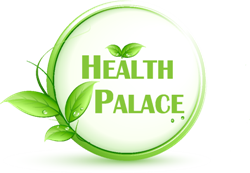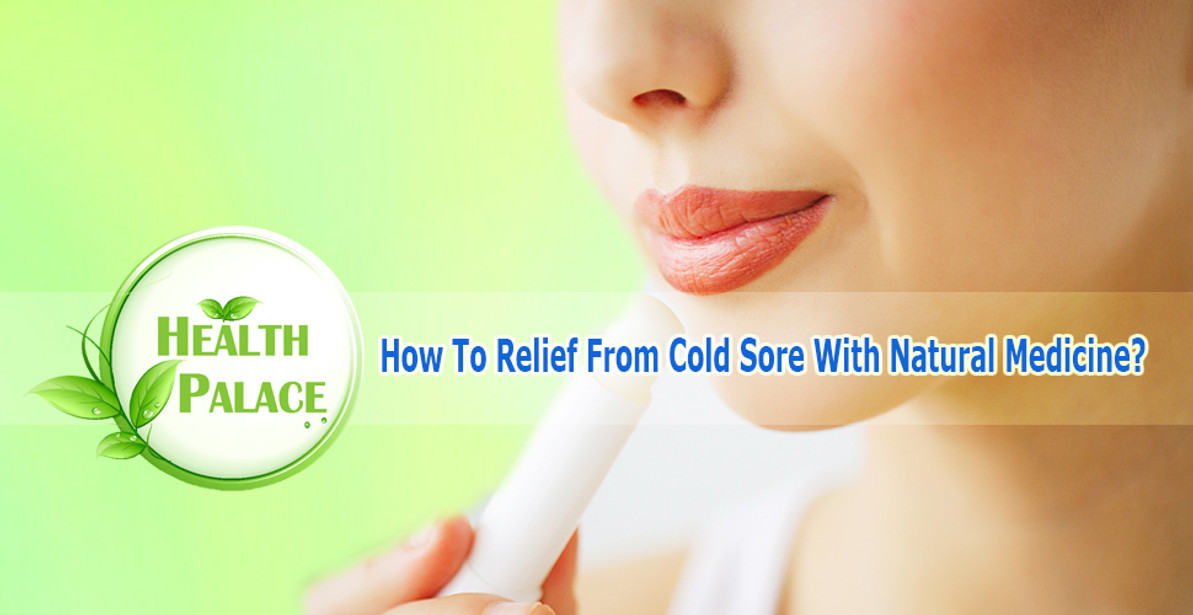How to Treat Cold Sores with Natural Medicine? | How to Prevent Cold Sores Naturally?
How To Treat Cold Sores With Natural Medicine
Ninety percent of all people get at least one cold sore in their life. Cold sores are caused by a virus, but not a cold virus; instead, they happen because of an infection with the herpes simplex virus (HSV). Cold sores, can appear anywhere on the body. They're most likely to appear on the outside of the mouth and lips, but they can also be found on the nose, cheeks, or fingers. The sores usually last 7 to 10 days and could spread to other people. Cold sores generally are not serious, but the infection may be life-threatening for anyone with low immune system, elderly, kids, or when the infection spreads to the eyes and brain. Those with skin conditions such as eczema may experience a larger spread of the cold sores on their body.
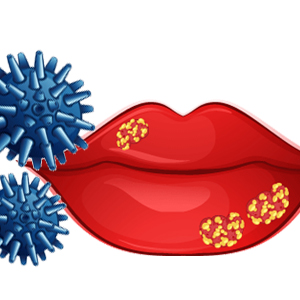
How Cold Sore Starts?
Cold sores are small, painful, fluid-filled blisters or sores that appear on the lips, mouth, or nose caused by a virus . Unlike most viral infections, the cold sore virus is not completely eliminated by the body defenses. For this reason they often recur.
There are two types of herpes simplex virus that can cause cold sores: HSV type 1 and HSV type 2. Cold sores are usually caused by HSV type 1.
Individuals catch HSV when come into contact with people or things that carry the virus. For example, from kissing someone who's infected or when sharing eating utensils, towels, or razors.
One of the most important properties of herpes virus (Herpesviridae) is its ability to form a latent infection, which means that the virus can stay dormant in the body and becoming “re-activated” under certain conditions, showing symptoms long after the initial infection.
Triggers to the reactivation of herpes virus are suggested to be a local injury, or systemic factors such as emotions, stress, fatigue, fever, trauma, allergies, certain foods, sunlight exposure, and hormone changes such as during menstrual periods. But perhaps the most prominent factor among older adults, is general age-related decline in immune function.
Infection with any member of the herpes virus family involves several steps. First, the virus attaches to the receptors on the external surface of human cells and enters into the cell. Then Virus uses the human cell to make many copies of itself (replicate). This stage is known as the primary infection, and while it can cause a period of illness, person may also be without any symptoms and unaware of the infection.
In addition to using the cell to replicate, herpes viruses are equipped with certain class of gene products known as latency-associated transcripts (LATs), which remain in the body and can reactivate the viral replication process.
Members of the herpes virus family typically travel across sensory nerves until they reach large nerve clusters called ganglia, where they replicate undetected by the host.
HSV-1 is the common cause of oral herpes. Herpes spreads by skin-to-skin contact of an individual that has been infected with the virus. Many cases initially contract this virus as an infant or child. The virus gains access to the body through mucous membranes or breaks in the skin.
Infection with either herpes virus can initially show as small fluid-filled blisters on the skin. Once the initial infection wares off, the virus spreads to the nerve cells where it stays dormant until it is reactivated. The frequency of the recurrent outbreaks differs from person to person; some individuals never experience any outbreaks (asymptomatic carriers), while others may have monthly or occasional outbreaks. It is unknown why some individuals are asymptomatic while others have outbreaks, but both asymptomatic and symptomatic patients are able to infect others.
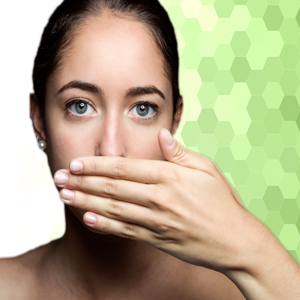
Signs & Symptoms of Cold Sores:
Usually the first oral infection with HSV causes painful sores to appear in or around the mouth, which is also known as herpetic gingivostomatitis. In some cases swollen gums are the only symptom, and other times no symptoms may develop at all. The most common locations for these sores are the lips, the area around the mouth, and the tongue, however the blisters can appear on any skin-covered area. .
Before these sores appear, the skin may itch, tingle, or burn . The sores usually appear for the first time 1 to 3 weeks after contact with the infected person and may last up to 14 days. It can be accompanied with fever, a sore throat, and swollen neck lymph nodes, especially during the first episode, which can make eating and drinking difficult. When cold sores recur, the blisters stage is usually short. Blisters dry up rapidly and leave scabs that last anywhere from a day to several days, depending on the severity of the infection.
Herpes infections can also cause several complications by spreading to one or both eyes, and when the cornea is affected, it causes pain, sensitivity to light, a gritty feeling in the eye, and discharge ; which if left without treatment, it may result in scarring, cloudy vision or even blindness, requiring corneal transplantation .
Herpes infections may affect fingers via breaks in the skin, causing a condition known as herpetic whitlow, in which the fingertip becomes swollen, red, and painful. Herpes can also infect the brain, leading to herpes encephalitis. Other internal organs, such as the lungs and esophagus, can be infected as well, but this is rare.
Which Natural Medicine Can Help Relief Cold Sore Symptoms?
Cold sores are caused by the Herpes simplex virus which stays dormant in the nervous system. Immune system can no longer keep this virus inactive when we are under stress. This could be the common cold, certain foods, work or emotional upset. People who are prone to cold sore should get to know what triggers them to help reduce the number of out breaks. Tingling, burning, or itching may be felt around the lips for several hours or a day prior to cold sore appear, this is the best time to begin treating cold sore. The best approach to treat cold sore is to take care of it early before even it can be seen. Treating cold sore in its earliest stage can result in smaller sore that heals quickly. Ideally, the cold sore may be stopped in its track so it doesn't appear.
There are several natural treatments which may help reduce the frequency of outbreaks and provide quicker relief by helping to maintain healthy immune system they would provide a great help to prevent outbreaks. Certain Vitamins such as Vitamin C, Vitamin D, and Vitamin A provide immune protection, and antioxidant benefits. In addition, It is recommended to use a proper sunscreen and avoid sun exposure to help prevent the outbreaks triggered by sun.
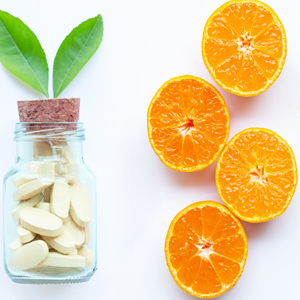
Vitamin C (ascorbic acid) is a great antioxidant and has natural antiviral properties. In Vitro Vitamin C has helped to prevent HSV-1 from replicating. In vivo those participants with active HSV-1 breakouts who took a formula containing vitamin C prevented the HSV-1 outbreaks when taken within 48 hours of onset of tingling or itching at the outbreak site. Also, when the vitamin C formula was taken after this period of time, it helped reduce the severity and the duration of the outbreaks.
More recent studies suggest that vitamin D may play a role as a potent immunomodulator. Vitamin D deficiency is associated with impaired immune function and increased susceptibility to infections. Vitamin D is able to increase the levels of an immunologic antimicrobial peptide called cathelicidin, which has antiviral properties against HSV-1 and other viruses. Vitamin D level is apparently associated with antibody levels to several viruses, including herpes viruses, in children with multiple sclerosis. Higher vitamin D levels corresponded with more antibodies among children with multiple sclerosis.
Vitamin A and its precursor, beta-carotene, are potent antioxidants and may provide some benefits relevant to HSV infections. Beta-carotene can help protect the skin from sunlight damage, which is a known trigger of HSV-1 outbreaks. Plus, serum vitamin A levels appear to help reduce HSV viral shedding. Low vitamin A levels were associated with increased shedding of HSV. This suggests that vitamin A may help prevent the transmission of herpes to others.
Zinc is a key role player in many aspects of the immune system. Zinc deficiency is associated with immune dysfunction and an increased risk of infection. Zinc levels tend to decrease with age, in parallel with declining immune health. In vitro, zinc sulfate has prevented the HSV-1 replication up to a 98%. Topical zinc ointments (Zinc Oxide) have been used successfully to treat skin outbreaks of herpes simplex in humans. Topical ointments containing zinc oxide along with other natural ingredients have helped to significantly improve oral herpes lesions.
The herpes simplex virus appears to require high amounts of the amino acid arginine to replicate. Amino acid Lysine has a similar structure to arginine and therefore woks against its effects, making it harder for HSV to replicate. Diets rich in lysine and low in arginine have helped suppress HSV replication. Participants who took one gram of L-lysine three times per day for 6 months reduced their frequency, duration, and severity of herpes outbreaks. L-lysine supplementation can reduce the frequency of cold sores that occur during HSV-1 infection. It appears regularly taking lysine is able to reduce the intensity and the frequency of HSV flare-ups.
Lactoferrin is a type of protein found in both cow and human milk. Lactoferrin provides natural antimicrobial properties by helping to protect the body from bacterial, fungal, parasitic, and viral infections. Particularly, lactoferrin is able to suppress HSV-1 and HSV-2 replication, and block the virus from entering cells.
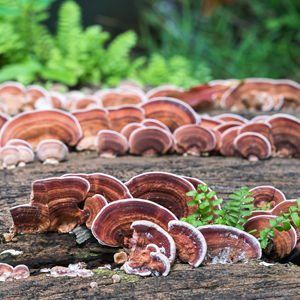
The reishi mushroom (Ganoderma lucidum) is a kind of medicinal fungus which some of its components appear to have antiviral benefits. Amongst reishi compounds GLPG (Ganoderma lucidum proteoglycan) and APBP (acidic protein bound polysaccharide), has provided strong antiviral activities against both HSV-1 and HSV-2 in vitro.
In participants with resistance to regular treatments against herpes and shingles infections, supplementation with reishi extract helped to reduce pain and to shorten the duration of symptoms.
Part of the reishi’s benefits may be due to its ability to overcome declining immune system due to aging. Combination of compounds in reishi including; a group of long-chain carbohydrates called polysaccharides, a unique protein named LZ-8, and a small group of steroid-like molecules called triterpenes help promote healthy immune responses against viral, bacterial, or fungal infections, while assist to reduce inflammation and therefore its unwanted impacts on immune health.
Variety of immune enhancing properties are identified from reishi including: promoting specialized dendritic cells and macrophages which are essential to react to new pathogens, vaccines, and cancer cells. Encouraging development of bone marrow, where most immune cells are born. Increasing numbers and functions of many cell lines in the immune system, such as natural killer cells, B Cells, and T cells for rapid response to a new or "remembered" antigen. Suppressing inflammatory markers produced during chronic inflammation, which is seen for instance, in rheumatoid arthritis, while maintaining normal inflammatory responses.
Lemon balm (Melissa officinalis) extract in lab has provided a variety of antiviral activities against both HSV-1 and HSV-2. Topical lemon balm preparations in participants helped to improve symptoms of oral herpes compared to placebo.
Antioxidants help protect against damage to immune cells, this is more important for the elderly, whose immune systems function less optimally than in younger individuals. Supplementation with antioxidants may help overcome age related immune decline and help prevent certain nutritional deficiencies, which are common among the elderly.
Participant who supplemented Coenzyme Q10, Vitamin E, Selenium and Methionine in the treatment of Chronic Recurrent Viral Mucocutaneous Infections, experienced a significantly faster healing with reduced incidence of relapses as compared to control groups, which was confirmed by decreased viral load and increased antiviral cytokine and peroxynitrite plasma levels.
Employing correct homeopathic remedy at the first sign, helps to prevent the outbreak; and if the cold sore is already a little advanced, then the correct remedy will help to speed up the healing. Repeated use of the remedy may also contribute to less frequent infections. If you are a cold sore sufferer, then you might want to have one of the following remedies on hand.
Nat mur It’s a fantastic remedy for cold sores that erupt on the lips specially after being in the sun. It can have large vesicles which burns, can develop with numbness and be tingling. The lips may have a tendency to be dry and cracked. there can be a craving for salt.
If cold sores tend to appear around menses then Sepia could be a great remedy. Feeling very tired, foggy and irritable before period would considered an indication for this remedy. The cold sores themselves will tend to be crusty and scabby at their worst. They may also appear around the nose and inside. Sepia is seen to help stop blistering and oozing from cold sores. If cold sores are particularly intense, Sepia might be a great choice.
Rhus tox is another great remedy for cold sores. When cold sores appear red, burning and itching. There may be some neuralgic pain in the face. The glands in the throat may also be slightly swollen. The vesicles may weep a yellow fluid. Rhus tox promotes a ‘crusting’ over the sore itself, that can stop additional blistering, bleeding, and oozing. Once the cold sore has crusted over, it can begin to heal.
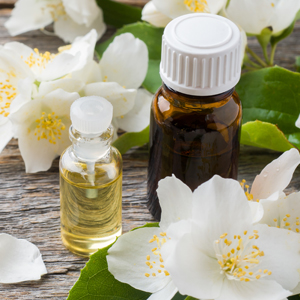
Certain essential oils can be useful for treating cold sores. Essential oils can be harmful if taken orally and when used to treat cold sore they should be diluted with carrier oil before being applied on the skin.
Applying a few drops of the peppermint essential oil mixed with almond oil has helped participants to stop activity of both herpes virus type 1 and type 2, with less recurrence.
Eucalyptus essential oil may help to treat cold sore and speed up healing due to its anti-inflammatory benefits. Eucalyptus oil is known to cause allergies and also only should be used after mixed with carrier oils.
Clove oil may have an antimicrobial and antiviral effect on the herpes simplex virus. It also may decrease pain associated with a cold sore. Clove oil is irritating and should be diluted with other oils before application.
Chamomile oil and lemon Balm oil both appear to prevent the adhesion of virus to the cells and might be used for resistant herpes simplex, but yet again it has to be mixed with carrier oils before application.
Teat tree oil is another great essential oil with ability to stop and kill herpes virus, Pure teat Tree oil also needs to be mixed with a carrier oil before use.
Recurrent cold sores usually do not require medical care. A few people may have cold sores that come so frequently that may need a daily medicine to reduce the number of attacks. It is not possible to predict for how long the treatment should continue, because the virus continues to live in the ganglion. Therefore, stopping suppressive treatment is usually a trial and error procedure. People who have very weak immune systems from cancer treatments or other causes may have very severe outbreaks of cold sores. Medical care should be considered to avoid complications.
Herpes can be spread from a cold sore to another area of the body, which is called "autoinoculation." Autoinoculation is common during the primary infection when viral shedding is high and the immune system is still trying to contain it. The antibodies that are made after primary infection are usually; but not always; help preventing autoinoculation during the recurrent attack. To prevent spreading the virus to other parts of the body, it is important to keep high levels of hygiene, and wash hands after touching the sore. A more serious complication is an ocular herpes, which causes sores and severe pain around the eye. If untreated, ocular herpes can lead to serious eye damage or even blindness. Cold sores may cause genital herpes which acquired through sexual contacts.
Related Articles:
Natural Solutions to Quick Recovery from Common Cold
Key Steps to De-stress and Improve Your Energy and Focus
Medicinal Mushrooms and their Immune boosting power
Articles and products featured by Health Palace are collected from a variety of sources and are provided as a service by Health Palace. These newsletters, while of potential interest to readers, do not necessarily represent the opinions nor constitute the advice of Health Palace. Presented materials are only for information purposes and do not intent to treat, cure, or prevent any disease.
References:
1.Albrecht, Mary. "Clinical Manifestations of Varicella-zoster Virus Infection: Herpes Zoster."UpToDate. UpToDate, July 2012c. Web. 02 Jan. 2013. <http://www.uptodate.com/contents/clinical-manifestations-of-varicella-zoster-virus-infection-herpes-zoster>.
2.Chida Y, Mao X. Does psychosocial stress predict symptomatic herpes simplex virus recurrence? A meta-analytic investigation on prospective studies. Brain, behavior, and immunity, 2009;23(7):917-925.
3.Hill JM, Sedarti F et al. Herpes Simplex Virus Latent Phase Transcription Facilitates in Vivo Reactivation. Virology, 1990; 174: 117-125.
4.Imai Y, Apakupakul K et al. Investigation of the Mechanism by Which Herpes Simplex Virus Type 1 LAT Sequences Modulate Preferential Establishment of Latent Infection in Mouse Trigeminal Ganglia. Journal of Virology, 2009; 83(16): 7873-7882.
5.Randall, Brian. "Lifestyle Changes to Manage Cold Sores." Munson Healthcare. Munson Healthcare, Sept. 2012. Web. 16 Jan. 2013. < http://www.munsonhealthcare.org/Taxonomy/RelatedD...>
6.Yarnell E, Abascal K et al. Herbs for Herpes Simplex Infections. Alternative and Complementary Therapies, 2009; 15(2): 69-74.
7.Zwaagstra JC, Ghiasi H et al. Activity of Herpes Simplex Virus Type 1 Latency-Associated Transcript (LAT) Promoter in Neuron-Derived Cells: Evidence for Neuron Specificity and for a Large LAT Transcript. Journal of Virology, 1990; 64(10): 5019-5028.
8.Brinkevich SD, Boreko EL et al. Radical-Regulating and Antiviral Properties of Ascorbic Acid and its Derivatices. Bioorganic and Medicinal Chemistry Letters, 2012; 22: 2424-2427.
9.Byun SH, and Jeon Y. Administration of Vitamin C in a Patient with Herpes Zoster - A case report. The Korean journal of pain, 2011;24(2):108-111.
10.Furuya A, Uozaki M, Yamasaki H, Arakawa T, Arita M, Koyama AH. Antiviral effects of ascorbic and dehydroascorbic acids in vitro. International Journal of Molecular Medicine, 1998;22(4): 541-545.
11.Aranow C. Vitamin D and the Immune System. Journal of Investigational Medicine, 2011; 59(6): 881-886.
12.Beard JA, Bearden A et al. Vitamin D and the Anti-Viral State. Journal of Clinical Virology, 2011;50: 194-200.
13.Lang PO, Samaras N et al. How Important is Vitamin D in Preventing Infections? Osteoporosis International, 2012. [Epub ahead of print]
14.Mowry EM, James JA et all. Vitamin D status and Antibody Levels to Common Ciruses in Pediatric-Onset Multiple Sclerosis. Multiple Sclerosis, 2011; 17(6): 666-671.
15.Naeem Z. Vitamin D deficiency- an ignored epidemic. International Journal of Health Sciences (Qassim), 2010;4(1):V-VI.
16.Antoine TW, Mishra YK et al. Prophylactic, Therapeutic and Neutralizing Effects of Zinc Oxide Tetrapod Structures Against Herpes Simplex Virus Type-2 Infection. Antiviral Research, 2012; 96: 363-375.
17.Bourne N, Stegall R et a. Efficacy and Toxicity of Zinc Salts as Candidate Topical Microbicides Against Vaginal Herpes Simplex Virus Type 2 Infection. Antimicrobial Agents and Chemotherapy, 2005; 49(3): 1181-1184.
18.Godfrey HR, Godfrey NJ et al. A Randomized Clinical Trial on the Treatment of Oral Herpes with Topical Zinc Oxide/Glycine. Alternative Therapies, 2001; 7(3): 49-55.
19.Haase H and Rink L. The Immune Sysytem and the Impact of Zinc During Aging. Immunity and Aging, 2009; 6(9).
20.Overbeck S, Rink L et al. Modulating the Immune Response by Oral Zinc Supplementation: A Single approach for Multiple Diseases. Archives of Immunological Therapy Experiments, 2008; 58: 15-30.
21.Prasad AS. Zinc in Human Health: Effect of Zinc on Immune Cells. Molecular Medicine, 2008; 14(5-6): 353-357.
22.Andersen JH, Jenssen H, Sandvik K, Gutteberg TJ. Anti-HSV activity of lactoferrin and lactoferricin is dependent on the presence of heparan sulphate at the cell surface. Journal of Medical Virology, 2004;74(2):262-271.
23.Berlutti F, Pantanella F et al. Antiviral Properties of Lactoferrin---A Natural Immunity Molecule. Molecules, 2011; 16: 6992-7018.
24.Jennsen H, Sandvik K et al. Inhibition of HSV Cell-To-Cell Spread by Lactoferrin and Lactoferricin. Antiviral Research, 2008; 79: 192-198.
25.Jennsen H. Anti Herpes Simplex Virus Activity of Lactoferrin/Lactoferricin-An Example of Antiviral Activity of Antimicrobial Protein/Peptide. Cellular and Molecular Life Sciences, 2005; 62: 3002-3013.
26.Marr AK, Jennsen H et al. Bovine Lactoferrin and Lactoferricin Interfere with Intracellular Trafficking of Herpes Simplex Virus-1. Biochimic 2009; 91: 160-164.
27.Valenti P and Antonini G. Lactoferrin: An Important Host Defence Against Microbial and Viral Attack. Cellular and Molecular Life Sciences, 2005; 62: 2576-2587.
28.EBSCO CAM Review Board "Lysine." NYU Langone Medical Center. NYU, June 2011. Web. 03 Jan. 2013. <http://www.med.nyu.edu/content?ChunkIID=21791>.
29.Griffith RS, Walsh DE et al. Success of L-Lysine Therapy in Frequently Recurrent Herpes Simplex Infection. Dermatologica, 1987; 175: 183-190.
30.Astani A, Reichling J, Schnitzler P. Melissa officinalis extract inhibits attachment of herpes simplex virus in vitro. Chemotherapy. 2012;58(1):70-77.
31.Dimitrova Z, Dimov B, Manolova N, Pancheva S, Ilieva D, Shishkov S. Antiherpes effect of Melissa officinalis L. extracts. Acta microbiologica Bulgarica. 1993;29:65-72.
32.Geuenich S, Goffinet C, Venzke S, Nolkemper S, Baumann I, Plinkert P, . . . Keppler OT. Aqueous extracts from peppermint, sage and lemon balm leaves display potent anti-HIV-1 activity by increasing the virion density. Retrovirology. 2008;5:27.
33.Schnitzler P, Schuhmacher A, Astani A, Reichling J. Melissa officinalis oil affects infectivity of enveloped herpesviruses. Phytomedicine : international journal of phytotherapy and phytopharmacology. Sep 2008;15(9):734-740.
34.Vahabpour-Roudsari R, Shamsi-Shahrabadi M et al. Evaluation of Potential Antiviral Activity of the Hydroalcoholic Extract of Lemon Balm L. Against Herpes Simplex Virus Type 1. Iranian Journal of Virology, 2010; 4(3&4): 52-57.
35.Wolbling RH, Leonhardt K. Local therapy of herpes simplex with dried extract from Melissa officinalis. Phytomedicine : international journal of phytotherapy and phytopharmacology. Jun 1994;1(1):25-31.
36.Chan WK, Lam DT, Law HK, Wong WT, Koo MW, Lau AS, . . . Chan GC. Ganoderma lucidum mycelium and spore extracts as natural adjuvants for immunotherapy. Journal of alternative and complementary medicine (New York, N.Y.). Dec 2005;11(6):1047-1057.
37.Dudhgaonkar S, Thyagarajan A, Sliva D. Suppression of the inflammatory response by triterpenes isolated from the mushroom Ganoderma lucidum. International immunopharmacology. Oct 2009;9(11):1272-1280.
38.Hijikata Y and Yamada S. Effect of Ganoderma Lucidum on Postherpetic Neuralgia. American Journal of Chinese Medicine, 1998; 26: 375.
39.Jan RH, Lin TY, Hsu YC, Lee SS, Lo SY, Chang M, . . . Lin YL. Immuno-modulatory activity of Ganoderma lucidum-derived polysacharide on human monocytoid dendritic cells pulsed with Der p 1 allergen. BMC immunology. 2011;12:31.
40.Jeurink PV, Noguera CL, Savelkoul HF, Wichers HJ. Immunomodulatory capacity of fungal proteins on the cytokine production of human peripheral blood mononuclear cells. International immunopharmacology. Aug 2008;8(8):1124-1133.
41.Ji Z, Tang Q, Zhang J, Yang Y, Liu Y, Pan YJ. Immunomodulation of bone marrow macrophages by GLIS, a proteoglycan fraction from Lingzhi or Reishi medicinal mushroom Ganoderma lucidium (W.Curt.:Fr.) P. Karst. International journal of medicinal mushrooms. 2011;13(5):441-448.
42.De Luca C, Khareva Z et al. Coenzyme Q10, Vitamin E, Selenium and Methionine in the Treatment of Chronic Recurrent Viral Mucocutaneous Infections. Nutrition, 2012; 28(5): 509-514.
43.Hughes D. Dietary Antioxidants and Human Immune Function. Nutrition Bulletin, 2000; 25: 35-41
44.Gaby AR. Natural remedies for Herpes simplex. Alternative Medicine Review, 2006;11(2):93-101.
45.Khan MT, Ather A et al. Extracts and Molecules from Medicinal Plants Against Herpex Simplex Viruses. Antiviral Research, 2005; 67: 107-119.
46.Singh BB, Udani J et al. Safety and Effectiveness of an L-Lysine, Zinc and Herbal-Based Product on the Treatment of Facial and Circumoral Herpes. Alternative Medicine Review, 2005; 10(2): 123-127.
47.Astani A1, Reichling J, Schnitzler P. Melissa officinalis extract inhibits attachment of herpes simplex virus in vitro.Chemotherapy. 2012;58(1):70-7. doi: 10.1159/000335590. Epub 2012 Feb 23.https://www.ncbi.nlm.nih.gov/pubmed/22377592.
48.Koch C1, Reichling J, Kehm R, Sharaf MM, Zentgraf H, Schneele J, Schnitzler P. Efficacy of anise oil, dwarf-pine oil and chamomile oil against thymidine-kinase-positive and thymidine-kinase-negative herpesviruses.J Pharm Pharmacol. 2008 Nov;60(11):1545-50. doi: 10.1211/jpp/60.11.0017.https://www.ncbi.nlm.nih.gov/pubmed/18957177.
49.Athbi Alqareera, Asma Alyahya, Lars Andersson. The effect of clove and benzocaine versus placebo as topical anesthetics.Journal of Dentistry Volume 34, Issue 10, November 2006, Pages 747-750.
50.Schuhmacher A1, Reichling J, Schnitzler P. Virucidal effect of peppermint oil on the enveloped viruses herpes simplex virus type 1 and type 2 in vitro. Phytomedicine. 2003;10(6-7):504-10.
51.Columbia University College of Dental Medicine: "Cold Sores and Fever Blisters."
52.Stuart-Harris C. The epidemiology and clinical presentation of herpes virus infections. The Journal of Antimicrobial Chemotherapy, 1983;12 Suppl B:1-8.
53.Cernik, C., K. Gallina, and R.T. Brodell. "The Treatment of Herpes Simplex Infections: An Evidence-Based Review." Arch Intern Med 168.11 June 9, 2008: 1137-1144.
54.Sucato G, Celum C et al. Demographic rather than behavioral risk factors predict herpes simplex virus type 2 infection in sexually active adolescents. The Pediatric Infectious Disease Journal, 2001;20(4):422-426.
Recent Posts
-
Macular degeneration
Macular degeneration which is commonly known as age-related macular degeneration (AMD /ARMD), is a m …7th Sep 2025 -
Maintain A Healthy Heart Rhythm With Integrative Medicine
Maintain A Healthy Heart Rhythm With Integrative Medicine;Usually, abnormal heart rate or arrhythmi …4th Feb 2021 -
How to Prevent Gallstones from Forming? | Natural Supplements for Gallstones
How To Prevent Gallstone Formation?Gallstones are hard deposits made of cholesterol or bilirubin f …4th Mar 2020
